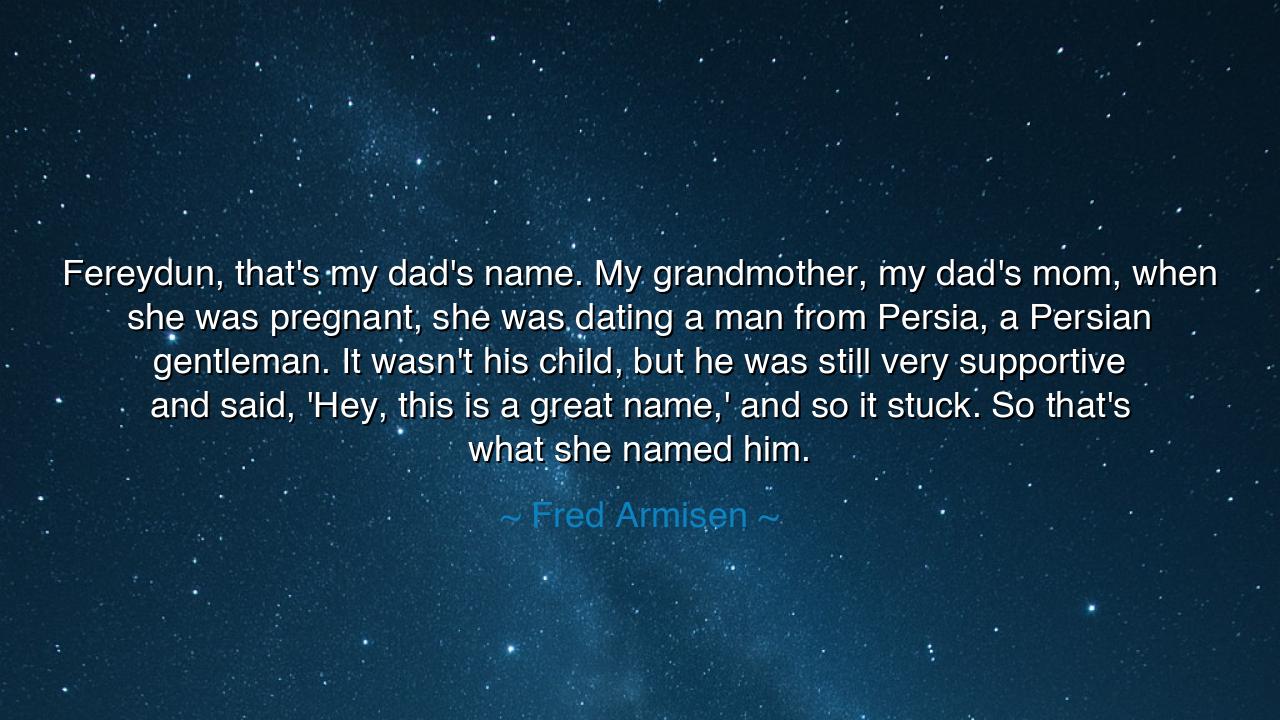
Fereydun, that's my dad's name. My grandmother, my dad's mom
Fereydun, that's my dad's name. My grandmother, my dad's mom, when she was pregnant, she was dating a man from Persia, a Persian gentleman. It wasn't his child, but he was still very supportive and said, 'Hey, this is a great name,' and so it stuck. So that's what she named him.






When Fred Armisen said, “Fereydun, that’s my dad’s name. My grandmother, my dad’s mom, when she was pregnant, she was dating a man from Persia... it wasn’t his child, but he was still very supportive and said, ‘Hey, this is a great name,’ and so it stuck,” he told a story that, on the surface, seems simple — the story of a name. Yet beneath it lies something ancient and powerful: the mystery of inheritance, the kindness of strangers, and the way names carry the weight of lives, cultures, and unseen connections across time. A name, after all, is more than a sound. It is a vessel of memory, an emblem of love, and a bridge between what was and what will be.
In this tale, the name Fereydun — born of Persia, land of poets and kings — becomes more than an ornament; it becomes a symbol of compassion. The man who suggested it had no obligation, no blood tie, and yet he offered a gift that would outlast his presence. Such moments are the secret threads that hold the world together. They remind us that sometimes, greatness arises not from grand deeds, but from quiet gestures of goodwill. In giving that name, he gave a legacy — one that would ripple forward, shaping not only a life but a lineage.
To understand the depth of this, one must recall the story of Fereydun himself, the legendary hero from the ancient Persian Shahnameh, the “Book of Kings.” Fereydun was the just king who overthrew the tyrant Zahhak, freeing his people from darkness. He was a symbol of righteousness, wisdom, and renewal. By bestowing that name, the Persian gentleman gave not only a word, but a story — a moral inheritance of courage and hope. Thus, the name became both a blessing and a prophecy, carrying with it the light of an ancient civilization into a new life, far from its origin.
So it is that names often travel farther than the people who give them. They cross oceans, outlive wars, and carry fragments of lost worlds into the present. A name can be an echo of gratitude, an offering of friendship, or a token of love. In Fred Armisen’s telling, we see how something as delicate as a single word can outlast bloodlines — how heritage can be born from kindness, not just ancestry. It is a reminder that family, too, can be chosen, expanded by acts of empathy that defy boundaries.
Consider the story of Ruth, the Moabite woman from the ancient scriptures, who chose to follow her mother-in-law Naomi to a foreign land. When Naomi urged her to return home, Ruth said, “Your people shall be my people, and your God my God.” By this choice, she wove herself into a new lineage — one that would eventually give rise to kings. Like the Persian man in Armisen’s story, she too embodied a truth beyond borders: that love and loyalty, not blood alone, create the deepest forms of belonging.
The ancients taught that every name carries a spirit — a breath of the one who speaks it and of the one who bears it. To name is to create; to receive a name is to inherit meaning. The act of naming, therefore, is sacred. In Fred’s account, the name “Fereydun” is both an offering and an anchor — it connects his father’s story to a culture he never lived in, yet somehow belongs to. It whispers of how identity is shaped not only by where we come from, but by those who touch our lives along the way.
From this story, we may draw a timeless lesson: that the smallest act of kindness can become an heirloom of the soul. The Persian man who offered a name may have vanished from history, yet his compassion endures in the very syllables of that name, carried by generations. So too in our own lives, we can offer others gifts that outlast us — not gold or glory, but words of encouragement, gestures of support, names of hope. For when we give freely, we plant seeds whose fruit we may never see, but which others will harvest in due time.
So, dear listener, remember this truth: what we pass forward need not be vast to be eternal. A name, a kind word, a moment of grace — these are the stones upon which legacy is built. Live, then, as the Persian gentleman lived: ready to give meaning where none is required, to offer beauty without claim. For one generous act, like one good name, can travel farther than we ever will — carrying with it the story of who we were, and the light of what we believed.






AAdministratorAdministrator
Welcome, honored guests. Please leave a comment, we will respond soon